Dr. Paul T. P. Wong’s autobiography, A Lifelong Search for Meaning: Lessons on Virtue, Grit, and Faith, is published in weekly installments. Stay updated here.
“Don’t try to get in where you are excluded; go to where you are wanted. If nobody wants you, then create your own club.” This is the painful lesson I have learned from a life experience of being excluded.
This is the second most difficult chapter to write in my autobiography, second only to Chapter 18. In both cases, I went through “hell” before coming out stronger and wiser.
In writing this chapter, I have done much soul searching. Am I the cause of my exclusion? Is it because of my intensity, my outspokenness, or my critical mind? Is it a case of Don Quixote tilting at windmills or a heroic campaign to create something new? Let my readers be the judge.
From my understanding, a big part of Viktor Frankl’s logotherapy has to do with how to live a responsible and virtuous life (Wong & Reilly, 2017). What happened to me was simply unbelievable and completely contrary to Frankl’s teaching. Therefore, after much agonizing, I have decided to mention the names involved in my expulsion so that other people associated with the Texas-based Viktor Frankl Institute of Logotherapy will not be unfairly implicated. I have also retained both the hardcopy and the electronic versions of all relevant correspondence for future research.
My Dubious Honour of Joining the “Elite Club”
Alfred Adler was one of the original members of the Vienna Psychoanalytic Society and only next to Sigmund Freud in prominence. When Adler’s emphasis on “power” became too different from Freud’s emphasis on “pleasure,” Adler was expelled by Freud from the Psychoanalytic Society. As a result, Adler started his own Society for Individual Psychology.
Frankl joined Adler’s Society from 1923 to 1927. When Frankl’s view became too unorthodox for Adler, the former was expelled by the latter. Frankl justified his own work as the “Third Viennese School of Psychotherapy” because of his unique contribution to the meaning of suffering.
There was clearly intolerance in the academic culture of Vienna in those early days of psychotherapy. Unfortunately, this practice of exclusion still continues. I too was expelled from the Texas-based Viktor Frankl Institute of Logotherapy in 1999 for my unorthodox views.
It is a dubious honour to belong to a small elite group of psychotherapists who have been expelled because of their creative ideas. As a result, I started the International Network on Personal Meaning (INPM) and vowed that no one will be expelled from the INPM because of their theoretical positions, as long as they share the common vision of advancing meaning-oriented research and interventions.
My Friendship with Joseph Fabry
Joseph Fabry was important not only for bringing logotherapy to North America and establishing the Viktor Frankl Institute of Logotherapy in California (which later moved to Texas) but also for encouraging me to start the INPM and the Meaning Conferences.
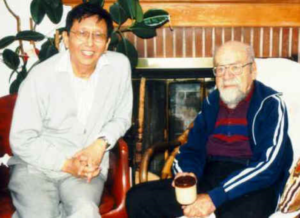
Image 1: Paul at the home of Dr. Joseph Fabry, after dinner (August 1998).
In 1994, I accepted the position of Director of the Graduate Program in Counselling Psychology at Trinity Western University (TWU). I began in earnest to formulate an integrative theoretical framework of counselling based on Frankl’s logotherapy. Year after year, students in my Counselling Theories course found my integrative meaning-centered counselling and therapy (MCCT) most helpful.
The first version of MCCT was presented in 1995 at the Colloquium of the University of British Columbia’s (UBC) Counselling Psychology Department. A revised version was presented in June 1996 at the First Congress of the World Council for Psychotherapy in Vienna, where Frankl himself gave the keynote address. Finally, it was further revised and published in 1997 in the International Forum for Logotherapy, as a paper entitled “Meaning-Centered Counselling: A Cognitive-Behavioral Approach to Logotherapy” (Wong, 1997).
When I first sent a copy of my UBC presentation to Dr. Joseph Fabry, editor of the International Forum for Logotherapy, he wrote back immediately, on July 26, 1995:
I read it with mounting enthusiasm, and relished every page. You have developed what I had hoped for a long time—the extension of Dr. Frankl’s ideas into a wider practical method of application.
In response to Fabry’s encouragement, in February 1997, I finally sent the first installment of my MCCT paper to him, to which he replied on February 11, 1997:
I was delighted to get your article and I am sending it on to Dr. Hutzell for processing into the Spring Forum. I welcome your developing logotherapy into ‘neo-logotherapy.’ I am not sure how Frankl will feel about it, but I think you have kept his basic ideas and expanded them.
This assessment has been repeated by many people who are familiar with logotherapy and MCCT.
I made a courtesy visit to Fabry in August 1998, in El Cerrito, California (see Image 1). During the visit, I discussed with him my plan for the first International Meaning Conference in Vancouver, Canada. Right after this visit, he wrote me the following:
I love to hear from you because you are one of the bright lights to illuminate the future of Logotherapy… As I told you, I would welcome your guest editing an issue of the Forum… An international congress in Vancouver would be an excellent idea and the Festival of Meaning for the New Millennium would be an attractive title. But we have to be careful that Dr. Barnes does not see it as competition. (J. Fabry, personal communication, August 1998)
This letter was copied to Dr. Barnes and Dr. Hutzell. At the same time, he also wrote to Dr. Barnes, his successor as President of the Viktor Frankl Institute of Logotherapy in Texas, to solicit his support for my Vancouver conference:
Dr. Wong is a co-fighter, friend, and supporter, and sees the Vancouver Congress as a boost to the movement. We might label it as the 13th World Congress. Or, he might want to see it as an independent Congress on Meaning, going beyond logotherapy. He is more research orientated than I am… So maybe that’s the way to go. (J. Fabry, personal communication, August 1998)
Unfortunately, things took an ugly turn soon after Dr. Fabry passed away in May 1999. Apparently, Dr. Fabry’s personal appeal to Dr. Barnes did not achieve the desired result; ironically, it only reinforced Barnes’ suspicion of my intention and motivated him to expel me from the Viktor Frankl Institute.
It is my privilege to have known Joe Fabry. He was an embodiment of logotherapy. In my eulogy to honour him, I wrote this comment:
Those who cling to the past and resist change will be relegated to the dustbin of history. But those who dare to pursue a new vision will make history. Indeed, Joe has made history in establishing the Viktor Frankl Institute of Logotherapy and The International Forum for Logotherapy. Even in his advanced age, he remained a courageous, prophetic visionary and storyteller, exploring new ways of expanding Dr. Frankl’s ideas.
My Connection with the Texas-Based Institute of Logotherapy
My connection with the Texas Institute actually began in 1995, when I submitted a paper entitled, “Sources of Personal Meaning Across the Life Span” to Dr. Barnes for the Tenth World Congress of Logotherapy in Dallas. The paper was immediately accepted with enthusiasm even though I had missed the submission deadline. My presentation was also well-received and rated as excellent by an overwhelming majority. Dr. Gina Giovinco, a prominent logotherapist, wrote to me on August 30, 1995: “You have opened another way to think about how we should or could direct others to discover personal meaning.”
In 1997, I organized a symposium on meaning research at the Eleventh World Congress of Logotherapy. It too was well-received, with luminaries in logotherapy—such as James C. Crumbaugh, Inge van Pelt, Patricia Stark, and Robert Hutzell—participating. A momentum was growing to promote meaning-oriented research.
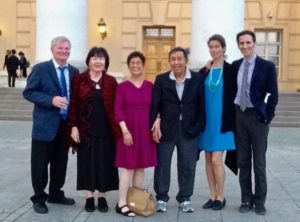
Photo with David Guttman (far left) and Alexander Batthyany (far right) at the Moscow Congress.
As a sponsor, my Graduate Counselling Psychology Department provided free advertisement on the website www.meaning.twu.ca, featuring the Eleventh World Congress of Logotherapy and my symposium at the Congress. This announcement generated several interesting inquiries. One inquiry came from Dr. Alexander Batthyány; in May 1999, he wrote: “I think the idea to create a network of value and meaning-centered research is great, and it is high time for someone to fulfill this task. Thank you.” He later became a long-time friend of the INPM; he has not only invited me to contribute to several of his edited books but has also invited me to keynote at the first Congress of Logotherapy in Moscow, 2013.
On the strength of Dr. Fabry’s recommendation, I was given the Statue of Responsibility Award at the Twelfth World Congress on Logotherapy in Dallas on July 2, 1999. My symposium was well-attended and new friendships were made to move logotherapy forward. My only concern was that there was hushed discussion of nominating me to be the next President of the Texas-based Viktor Frankl Institute of Logotherapy. I immediately discouraged such talk and warned, “Please, don’t get me in trouble. I am not interested in the position.”
The Inside Story of My Expulsion
What I feared did happen—I found myself in deep trouble. Merely ten days after the World Congress, I received a shocking letter from Robin Goodenough, a lawyer and member of the Executive Council of the Viktor Frankl Institute of Logotherapy in Texas. He wrote the letter on behalf of Dr. Barnes and informed me that I had been expelled from the Viktor Frankl Institute in Texas because of my “illegal and grossly unprofessional” conduct and “breaching the copyrights” of the name “Viktor Frankl Institute of Logotherapy” and “World Congress on Logotherapy” (R. Goodenough, personal communication, July 12, 1999). In the same hostile letter, he also threatened me: “Cease and desist your unauthorized and illegal activity. The Board disowns any association with you and your phony ‘Logotherapy’ programs.”
Thus, without ever meeting me or talking to me, Dr. Goodenough dismissed all my contributions to logotherapy with groundless accusations. As a lawyer, Mr. Goodenough should have known better.
Ironically, in a week, an award-winning member at the Congress and “a bright light for the future of Logotherapy” was suddenly charged and expelled for “illegal and unprofessional conduct.”
Thus, I was summarily indicted and “executed” with any opportunity to answer the charges. I immediately showed the letter from Mr. Goodenough to a Board member of the Viktor Frankl Institute of Logotherapy in Texas. He shook his head, smiled, and said: “Mr. Goodenough must have written this letter when he was drunk.” His advice to me was to “just take a deep breath and forget about this letter.” Later, I received evidence that other Board members were also not aware of the surprise “execution carried” out by Barnes and Goodenough.
According to insider information, as well as some Board members of the Viktor Frankl Institute of Logotherapy in Texas, Dr. Barnes was extremely sensitive about anyone trying to set up anything related to Logotherapy without his approval or control, even outside the USA. One of Dr. Barnes’ students once warned me that he could be very dangerous: “He would squash anything perceived as competition.” It was only after my expulsion before I fully appreciated her warning.
The Aftermath
In the larger scheme of things, the poisonous letter from Dr. Goodenough indeed had no significance. But, at the emotional level, such a gross violation of justice and irresponsible behavior could be very hurtful. I can even understand why Barnes was oversensitive to competition because of his chronic physical disability, but the letter from the late Goodenough was beyond the pale.
At the deepest recess of my mind, I struggled for many years with the question: How could intelligent people do something so irrational and unethical? One hypothesis was that the letter was nothing more than an intimidation tactic, but it did not have the intended effect. On the contrary, it has actually motivated me to become an authority of logotherapy and meaning therapy (Wong, 2002, 2016, 2017). It also strengthened my resolve to establish the INPM.
I am also pleased that I have been able to maintain friendships with several board members and many members in the Viktor Frankl Institute of Logotherapy in Texas. Some of these friends have continued to support the INPM and our Meaning Conferences, but prefer to remain anonymous.
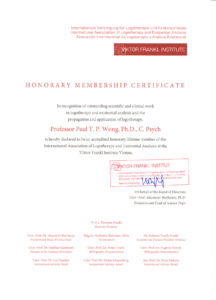
Image 3: Paul’s certificate of accreditation from the Viktor Frankl Institute of Vienna.
My confirmation also came from the Viktor Frankl Institute in Vienna, Austria. It not only granted me an honorable lifetime membership in the Viktor Frankl Institute, but also recognized the INPM as an accredited member of the institute, thus cementing the initial validation by Dr. Fabry.
Image 3: Paul’s certificate of accreditation from the Viktor Frankl Institute of Vienna.
I am deeply pained by the fragmentation of logotherapy in North America; many people have wondered why there is a split without any awareness of the poisonous letter from Dr. Goodenough. On a personal level, nothing hurts more than being falsely accused of illegal deeds, even though cognitively I knew that the injustice of my expulsion was nothing compared with those who have been sent to prison or executed simply for their dissenting political views (e.g., Amnesty International, 2017; Fang, 2016). I also took comfort from the fact that I did not suffer in vain because my ordeal has given birth to the INPM and Meaning Conferences.
The Birth of INPM
Thus, INPM was officially organized in the fall of 1999, with the full support of the Graduate Program of Counselling Psychology at TWU and the blessing of my Graduate Dean Dr. Don Page. I was very optimistic about the future of the INPM. I put in long hours each day without feeling tired, buoyed by my passion and faith. I was totally unaware that dark clouds were gathering in the distance from two directions—TWU and the Mainland Chinese Government.
Initially, my conception for the INPM was very simple: It would serve as a web-based hub for all people interested in logotherapy and meaning-oriented research; it would also serve as a departmental project for my graduate students to advance Viktor Frankl’s mission. We only had a visitor’s page for people to leave their name and comment after visiting our website.
At that time, we had no paid membership or formal organization, just a small website (www.meaning.twu.ca) managed by my assistant at the Graduate Counselling Psychology Program. By 1998, we had already demonstrated the effectiveness of our website. An internet search for Graduate Counselling Psychology Program in Canada would show that our program was always among the top three, regardless of which search engine we used. Another proof was that several students were attracted to our program because of our website.
In addition to posting meaning-oriented research and therapy on our website, we also posted announcements on activities and conferences of logotherapy organizations around the world as a way to advance the vision of Dr. Frankl. Unfortunately, we had to stop mentioning anything related to the Texas-based Viktor Frankl Institute, because of Dr. Goodenough’s warning.
Before the end of 1998, we had about 100 unpaid members. Our website already had the basic features of our future website (www.meaning.ca). In addition to pages dedicated to the Meaning Centered Counselling Network, the Meaning Research Network, and the Meaning of Life Discussion Forum (the three major divisions of the INPM back then), we also had Sign/View Guestbook, Worthy Lives Gallery, Teen Power, Successful Aging, Meaningful Careers, Meaning of Love, and Meaning of Death.
Unfortunately, because of the success of our page, the university decided to take control of the website; nothing could get posted online without the approval of the President’s Executive Assistant. They pointed out an article as being offensive to TWU. The article was entitled “The Meaning of Sex” written by a pastor about the biblical concept of sex. “TWU has nothing to do with sex,” President Snider said in all seriousness. Once again, I encountered the monster named Control. At that point, I knew that for the INPM to survive with integrity, I had to move it out of the university’s control.
That decision was not difficult, given the double whammy of the Texas bombshell and the clampdown from the President’s office. In 1999, I began the process of having the INPM registered as a learned society with the Federal Government of Canada, and purchased our own domain at www.meanng.ca. Even with the full support from my faculty and graduate students, I must have spent more than $5,000 of my own money to cover the legal fees for incorporation and the official INPM logo.
My vision for the INPM from the beginning has remained the same as described on our official website:
INPM is dedicated to advancing health, spirituality, peace, and human fulfillment through research, education, and applied psychology with a focus on the universal human quest for meaning and purpose. We accomplish this mission through research, publications, conferences, and public education.
From its inception, the INPM has had three divisions: (1) scientific research on personal meaning; (2) meaning-oriented therapies and applications; and (3) public education on meaningful living as a pathway towards global wellbeing and peace.
As indicated in the above mission statement, the INPM focuses on the universal human need for spirituality and meaning as the pathway towards a better world of harmony, peace, and fulfillment. We have adopted the strategy of organizing the Biennial International Meaning Conferences as an inclusive “big tent” for people from different countries and different theoretical stripes.
As an antidote to the disease of “power and control,” I vowed that the INPM would not become a hierarchical organization with a supreme commander. In contrast, the INPM would be governed by a responsible and competent Board of Directors and that its growth strategy would be to foster the development of horizontally connected sister organizations and conferences in other countries.
The First Meaning Conference in 2000
Inspired by Joe Fabry’s vision of an international festival of meaning, my concept of the First Meaning Conference was that it would be the first international, multidisciplinary conference focusing on the transforming power of meaning. The conference would feature researchers and psychotherapists from different traditions.
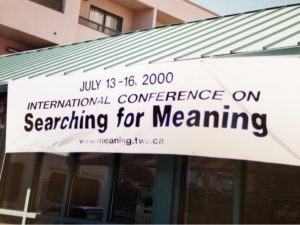
Image 4: The first Meaning Conference in 2000.
Organizing the first Meaning Conference also had its political obstacles. First of all, I had to submit a detailed budget to TWU and then sign a document stating that I would be personally responsible for any cost overrun. I had to answer all kinds of concerns raised by the administration. The most laughable questions raised were: How can we be sure that prizes for Essay Contest among high school students will not go to your own son? How do we know that you will not use the budget for the Gala Banquet on your family? I did not know how to answer such petit and offensive questions, because the administration knew that I was the most generous faculty supporter of the university, having donated more than $50,000. Some of the bureaucrats in the administration tended to project the worst motives onto others.
Secondly, I had to get permission from the Graduate Dean in order to go ahead with the conference. In order to secure the Graduate Dean’s support, I promised Don Page that the conference would be hosted by the Graduate School, including other graduate departments. This was a good move, because it broadened the base of the Meaning Conference.
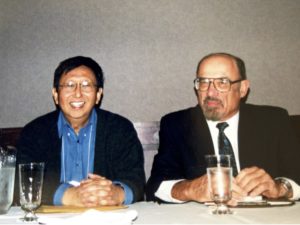
Image 5: Paul with Irvin Yalom at the First Meaning Conference.
The first meeting was held in Richmond, B.C., at the Airport Executive Plaza Hotel in July 2000, exploring the theme of “Searching for Meaning in the New Millennium.” Keynote speakers included Irvin Yalom, Director of the Erickson Foundation Jeffrey Zeig, and British existential psychologist Ernesto Spinelli.
Other invited speakers include the following. From the existential group, we had Kirk Schneider, Robert Solomon, and Al Mahrer; from the positive psychology group, we had David G. Myers, C. R. Snyder, and Salvatore Maddi; from management and leadership, Joe D. Batten and Alex Pattakos. Notable presenters from logotherapy included Father Tom McKillop, leader of the Toronto Logotherapy Group, and Dr. Daniel Gana, and Dr. Narnin Heisel, both members of the Toronto Logotherapy Group. In addition, we had Dr. Janus Fraillon, a logotherapist from Australia, Dr. John Cavenagh, editor of the Australian and New Zealand Society of Palliative Medicine, and Dr. Marianne Thorsen Gonzalez, logotherapist from Norway.
As part of the millennium celebration, we also organized a youth contest for high school students. The entry would be based on either “My Vision for a Positive Future” or “What is My Meaning in Life?” with monetary awards going to the first three winners. It attracted numerous entries
At the end, the conference was a surprising success. We had more than 200 attendees, far exceeding my expectations. However, financially, we incurred more than a $10,000 deficit, which was covered by myself. The efforts we mustered were worthwhile, because many attendees commented that this was the best academic conference they had ever attended. Here is one testimonial from Dr. William Smythe (2001):
In the summer of 2000, the first International Conference on Personal Meaning took place in Vancouver. The theme of the conference was “Searching for Meaning in the New Millennium.” Conference Chair Paul Wong of Trinity Western University declared the conference to be a history-making endeavour, especially as it served as the launching pad for the new International Network on Personal Meaning (INPM), home for what is now dubbed the “positive revolution” in psychology. Those of us who attended this conference came away with the distinct impression that something new was emerging on the disciplinary landscape of psychology. The topic of meaning, which had long been on the back burners of academic psychology, was coming into the foreground again. The personal quest for meaning in life could no longer be dismissed as a naive preoccupation of popular psychology but could be treated as serious issue for psychological research and practice.
The Positive Revolution Continues…
The First Meaning Conference served as a springboard for a positive revolution in the new millennium. I further articulated this positive revolution in our Second Meaning Conference in 2002:
There has been a lot of talk about the need for random kindness, community building, social capital, and ethical reform. Certainly, these are all elements of a positive revolution. But the underlying need is for a spiritual revolution, a spiritual transformation, which encompasses such positive values as love, compassion, forgiveness, reconciliation, redemption, integrity, trust, faith, and hope… The positive revolution will go on, slowly but surely—one person at a time, one family at a time, and one community at a time. It will continue in family rooms, lecture halls, counselling clinics, and wherever people meet, to the extent that more people catch the vision. I trust that the Second Meaning Conference will provide a strong impetus to this positive movement.
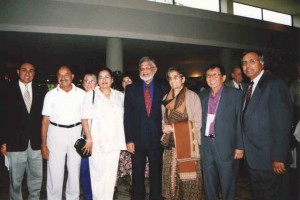
Image 6: Leaders of East Indian Canadians with Arun Gandhi.
The theme of this conference, “Freedom, Responsibility and Justice,” had proved to be timely in light of the current political context. Keynote speakers included Arun Gandhi, grandson of Mahatma Gandhi and Director of the Gandhi Institute for Non-Violence; psychologist Howard Gardner of Harvard University; Donald Meichenbaum, a psychologist at the University of Waterloo; and Mary Pipher, University of Nebraska psychologist and author of Reviving Ophelia.
We had over 300 participants from more than 30 countries at the Second Meaning Conference. Among them, 260 were members. The most memorable event was the lecture given by Arun Gandhi, which attracted more than 400 attendees, many from the B.C. Indian community.
Conclusion
We will be celebrating the 20th anniversary at the 10th Biennial Meaning Conference, back at the Executive Airport Plaza Hotel in Richmond, B.C., where we started our first Meaning Conference. Our conference theme of “Courage, Faith, and Meaning: Existential Positive Psychology’s Response to Adversity” reflects the same theme of true positivity—shining a light in the darkest hours.
The last 20 years have been an uphill struggle in keeping the INPM and the Meaning Conferences going. There have been more valleys than hilltops. I have sacrificed too much to see this positive movement derailed or perish. I am grateful for a number of individuals who have supported my endeavour faithfully—Salvatore Maddi, Deborah Khoshaba, Robert Neimeyer, Melanie Alsager, Harriet Wu, Suemay Chang, Joshua Wong (see Ch. 9), Carrina Wong Chan, and Michael Honey. My apology for omitting anyone. Of course, my wife Lilian C. J. Wong has always been by my side supporting the INPM.
There have also been many blessings along the way. First of all, I have had the opportunity to meet so many wonderful people from all over the world and have formed special relationships with some. As a result, my professional life has been greatly enriched by their work and their lives.
Secondly, many people have personally expressed their gratitude to me for creating the INPM and the Meaning Conferences. Their words of encouragement reassure me that my struggle has not been a total waste.
Finally, I am satisfied that my vision of a positive revolution based on Existential Positive Psychology (Wong, 2009) and Positive Psychology 2.0 (Wong, 2011) has gained some traction in recent years. My hope that this unique organization can continue to provide an academic home for all creative misfits and all who share my vision for the “big tent” approach towards research on meaning and wellbeing.
References
- Amnesty International. (2017). China. Amnesty Canada. Retrieved from http://www.amnesty.ca/our-work/priority-countries/china
- Fang, L. (2016). The most wanted man in China: My journey from scientist to enemy of the state (P. Link, Trans.). New York, NY: Holt.
- Smythe, W. E. (2001). Review of Exploring existential meaning: Optimizing human development across the life span. [Review of the book Exploring existential meaning: Optimizing human development across the life span. G. T. Reker & K. Chamberlain]. Canadian Psychology, 42(4), 335-337. http://dx.doi.org/10.1037/h0088138
- Wong, P. T. P. (1997). Meaning-centered counseling: A cognitive-behavioral approach to logotherapy. The International Forum for Logotherapy, 20(2), 85-94.
- Wong, P. T. P. (1999, August 3). Joe Fabry — A visionary storyteller. International Network on Personal Meaning. Retrieved from http://www.meaning.ca/therapy/therapists/Ther_pages/joseph_fabry.htm
- Wong, P. T. P. (2002). Logotherapy. In G. Zimmer (Ed.), Encyclopedia of psychotherapy (pp. 107-113). New York, NY: Academic Press.
- Wong, P. T. P. (2009). Existential positive psychology. In S. J. Lopez (Ed.), Encyclopedia of positive psychology (Vol. 1, pp. 361-368). Oxford, UK: Wiley Blackwell.
- Wong, P. T. P. (2011). Positive psychology 2.0: Towards a balanced interactive model of the good life. Canadian Psychology, 52(2), 69-81.
- Wong, P. T. P. (2016). Integrative meaning therapy: From logotherapy to existential positive interventions. In P. Russo-Netzer, S. E. Schulenberg, & A. Batthyány (Eds.), Clinical perspectives on meaning: Positive and existential psychotherapy (pp. 323-342). New York, NY: Springer.
- Wong, P. T. P. (2017). Logotherapy. In A. Wenzel (Ed.), The SAGE encyclopedia of abnormal and clinical psychology (pp. 1984). New York, NY: Sage.
- Wong, P. T. P., & Reilly, T. (2017, August 15). Frankl’s self-transcendence model and virtue ethics — Part 1 of 2. The Virtue Blog. Retrieved from https://thevirtueblog.com/2017/08/15/frankls-self-transcendence-model-and-virtue-ethics-part-1-of-2/
